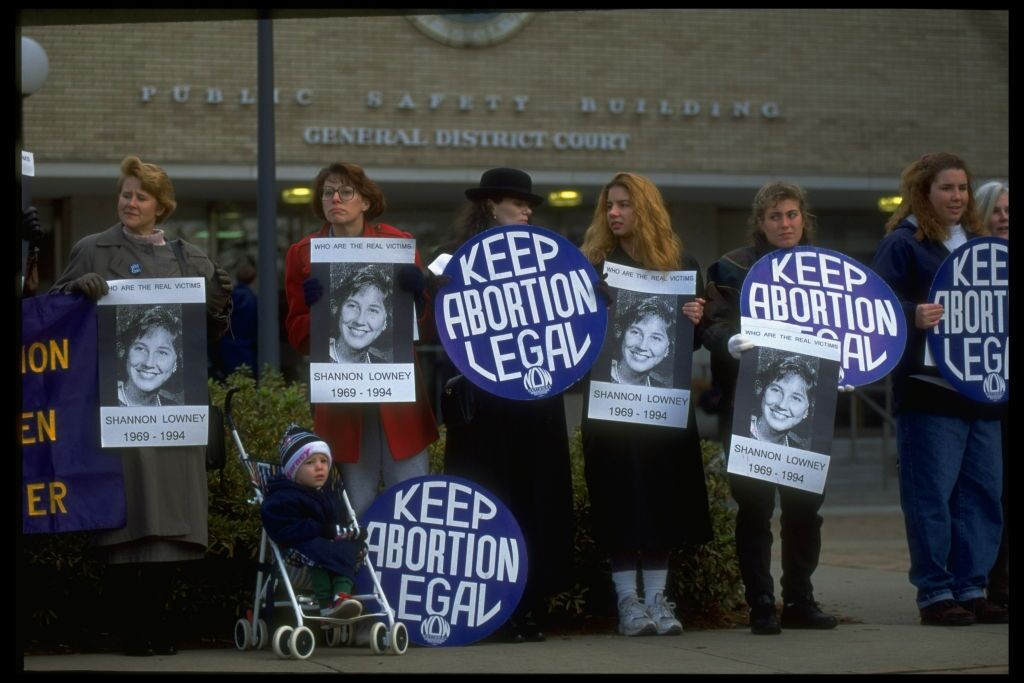Editor’s note: This article is Part 2 of Ms.’ four-part series on antiabortion violence. Read Part 1 here. Part 3 publishes Thursday, Sept. 18.
Julie Burkhart’s clinic was torched.
Burkhart, like Richardson, has been working in abortion facilities for years. And, like Ruth Richardson, CEO of Planned Parenthood North Central States, she is no stranger to threats or violence. In 1991, Burkhart was a young clinic worker in Wichita, Kan., when abortion opponents poured into town to participate in the so-called Summer of Mercy, a six-week protest organized by Operation Rescue (slogan: “If you believe abortion is murder, then act like it’s murder!”). They conducted blockades at the city’s three abortion clinics and threw themselves in front of cars to keep drivers from entering the clinics’ parking lots.
In 2009, Burkhart’s mentor, Dr. George Tiller, was shot in the head and killed as he was ushering at his Wichita church. The murder came 16 years after Tiller, one of the few doctors in the nation who performed abortions later in pregnancy, was shot in both arms by an extremist, and 23 years after his clinic was bombed.
Scott Roeder, a Kansas City electric-company worker, was convicted of first-degree murder after testifying that his opposition to abortion drove him to kill Tiller. “I did what I thought was needed to be done to protect the children. I shot him,” Roeder said. The jury reached its verdict in 37 minutes.
Roeder testified he had been thinking about killing Tiller since 1993, the year after he became a born-again Christian while watching Pat Robertson’s 700 Club on TV. He started attending antiabortion protests and became involved with Operation Rescue, which staged clinic blockades in the 1980s and ’90s, and allegedly the Army of God, which advocates using violence against abortion providers. Operation Rescue’s founder and former leader, Randall Terry, attended Roeder’s Wichita trial in a show of support, though the organization condemned the murder.

About four years after Tiller’s assassination, Burkhart reopened her own clinic in the same location, a move that attracted death threats and stalkers. Still, she soldiered on, and in 2020, at the invitation of a philanthropist, agreed to open a clinic in Casper, Wyo.
Before that clinic was ready, disaster struck. In May 2022, an arsonist set fire to the Casper building, causing extensive damage. It took 10 months for local and federal law enforcement agents to arrest a suspect, who was identified only after they tripled a reward to $15,000. A 22-year-old college student, Lorna Green, was convicted of arson.
Finally, in April 2023, Burkhart opened Wellspring Health Access, Wyoming’s sole abortion clinic. She also oversees two clinics in Illinois, one in Chicago and one in Granite City, near St. Louis, and she’s working to open another, this one in Colorado. According to Burkhart, a full 83 percent of patients at the Granite City clinic live outside Illinois.
Even as she has pushed forward, Burkhart told Ms. she is taking extra precautions to safeguard clinic employees, patients and herself, especially now that Trump has returned to office.
“It’s definitely more of an unsettling time,” she says.

The short woman with a long, dark braid entered the Delaware County Women’s Center shortly before 2:30 p.m. on July 31, the final day of a hot July in tiny Upland Borough, Pa., outside Philadelphia. She held the door for her two companions, then went to the registration desk and presented an ID stating that she was “Maria” as the two others darted into another room.
Within minutes, two more women entered the clinic, which provides abortion medication to patients who are no more than 12 weeks into their pregnancies. Like “Maria,” one of them said she had an appointment.
That was a lie.
The phony patients with fake IDs were part of a ruse to help several antiabortion activists invade and sow chaos inside the clinic, located in a now-defunct hospital building. Their intentions became obvious when one of the activists began passing out red roses, a symbol of the antiabortion group Red Rose Rescue, and “tickets to heaven,” recalls Amanda Kifferly, vice president for abortion access and director of security for that clinic and two others.
“We see the patients and partners put up their hands and sort of pull away from her because she’s becoming physical. And that’s when we call 911,” Kifferly says.
As clinic employees worked to protect real clients—and, mistakenly, one phony one—by shuttling them into designated lockdown areas, the invaders splashed a liquid (later identified as “holy water”) and sprinkled white powder (later identified as salt) on the floors and walls, Kifferly says. Clinic staff pulled the fire alarm. “Maria” ran out the door.
Two of those arrested, Joan Bell of New Jersey and William Goodman of New York, were among the convicts pardoned by Trump in January. Many of the others are familiar to abortion-rights advocates like duVergne Gaines, director of the Feminist Majority Foundation’s National Clinic Access Project. One of them lives in Pennsylvania; most traveled there from out of state, some from homes as far away as Texas.
It appears to have been the first clinic invasion since Trump pardoned Bell, Goodman and 21 others.
“These are coordinated attacks. They’re carried out by very well-known antiabortion extremists, many of them previously convicted, tried [who] should still be facing punishment for their crimes if they weren’t personally pardoned by Donald Trump,” says Roxanne McNellis, a spokesperson for the Women’s Centers. “And I think the reality is, right now, there’s a glorification of this type of behavior that’s coming down from the folks in power.”
The violence targeting providers and clinics does not end here. In Part 3, out Thursday, Ms. investigates the man accused of assassinating Minnesota officials this summer—and the extremist religious currents that may have inspired him.
Great Job Jodi Enda & the Team @ Ms. Magazine Source link for sharing this story.




